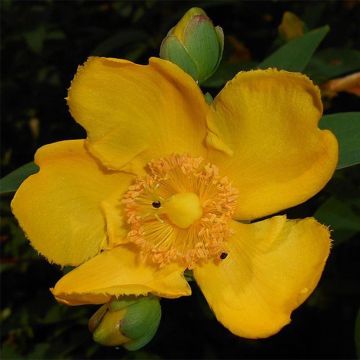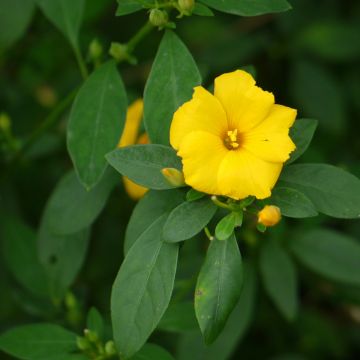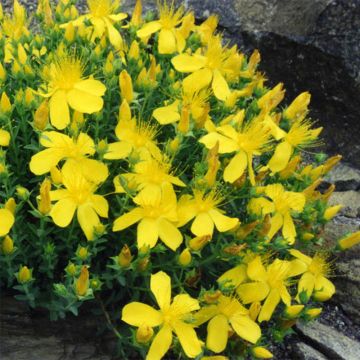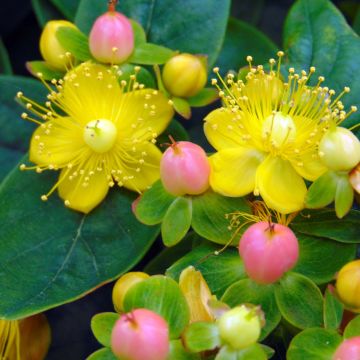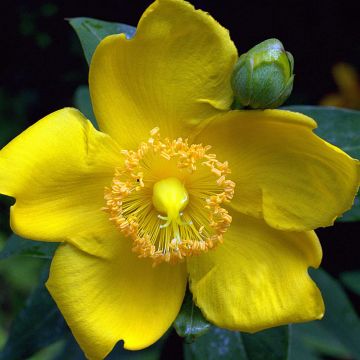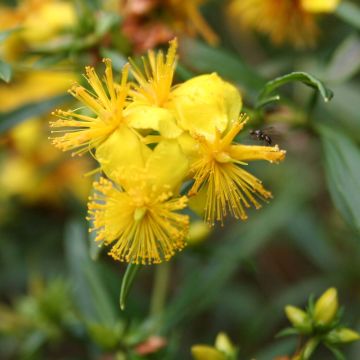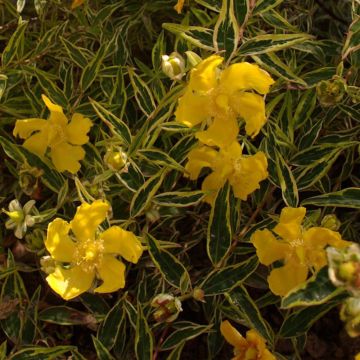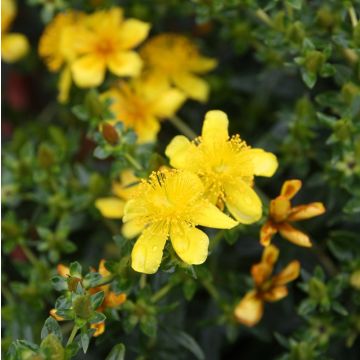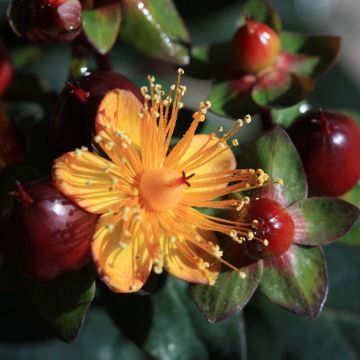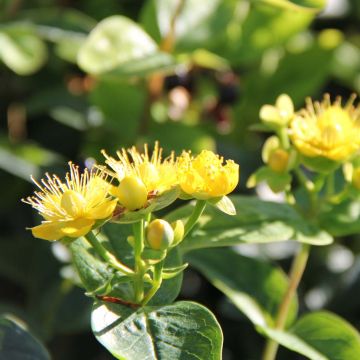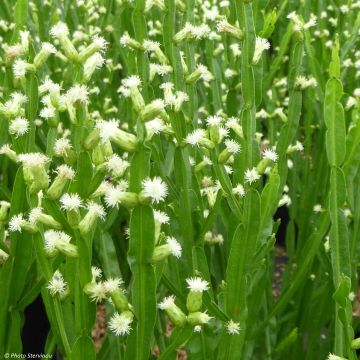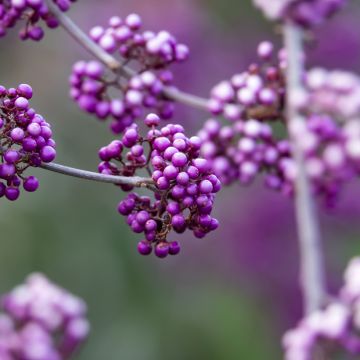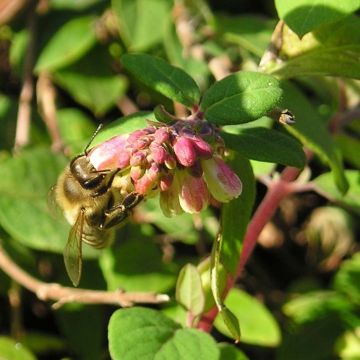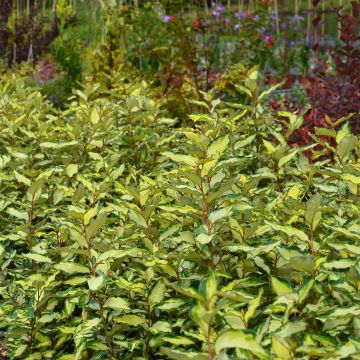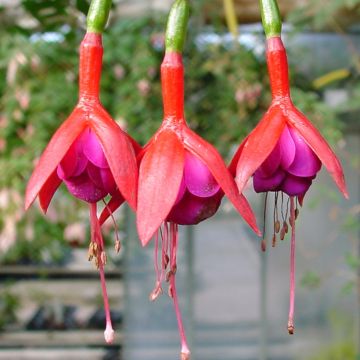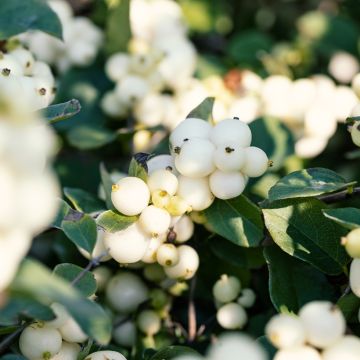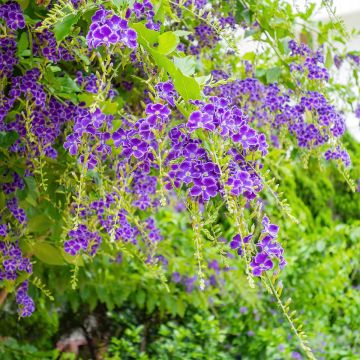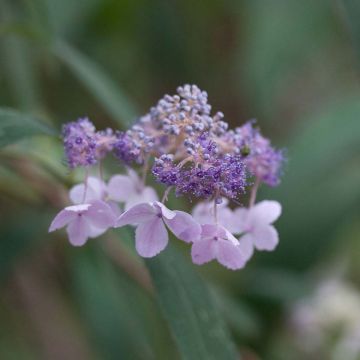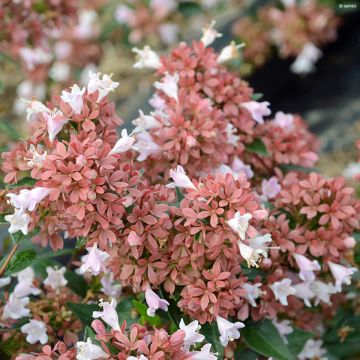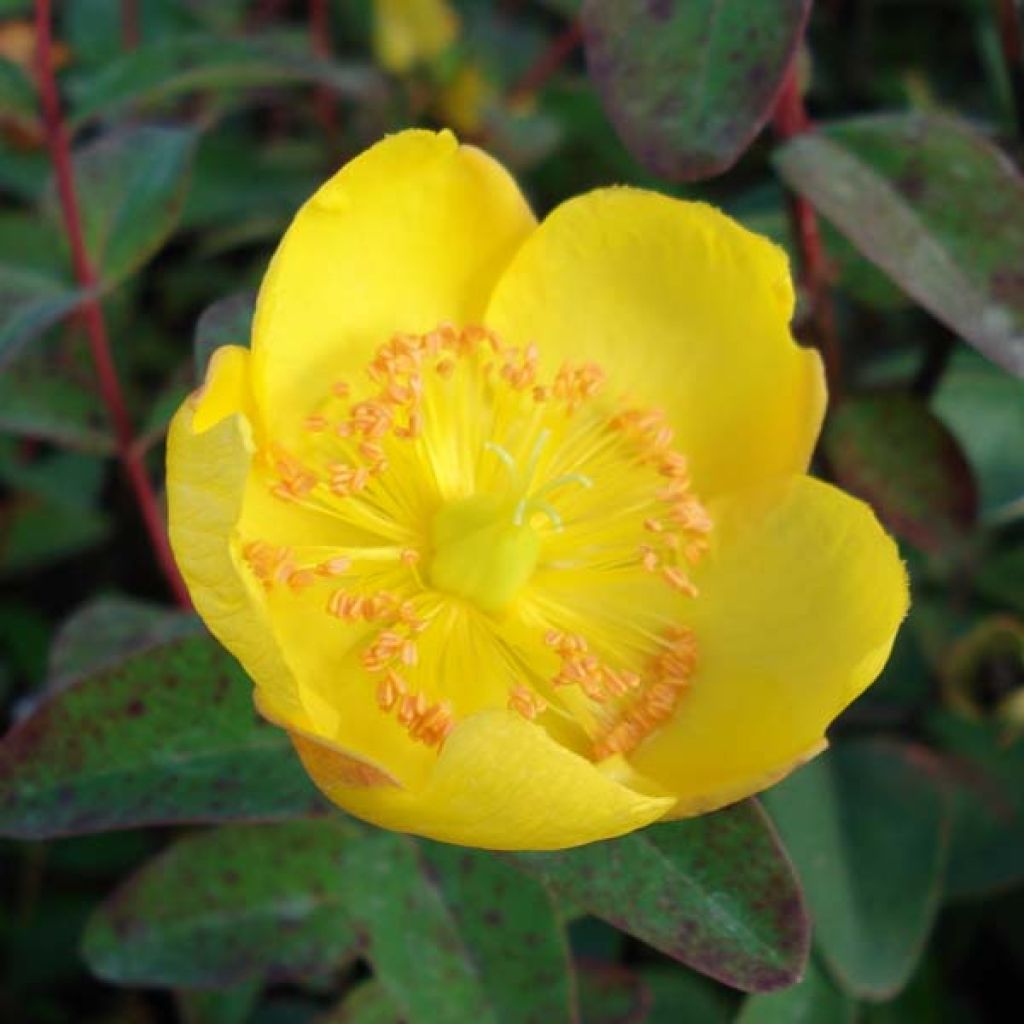

Hypericum x dummeri Peter Dummer - St. John's wort
Hypericum x dummeri Peter Dummer - St. John's wort
Hypericum x dummeri Peter Dummer
St. John's wort
This item cannot be shipped to the selected country
Delivery charge from €5.90
More information
Schedule delivery date,
and select date in basket
This plant carries a 24 months recovery warranty
More information
We guarantee the quality of our plants for a full growing cycle, and will replace at our expense any plant that fails to recover under normal climatic and planting conditions.
From €5.90 for pickup delivery and €6.90 for home delivery
Express home delivery from €8.90.

Does this plant fit my garden?
Set up your Plantfit profile →
Description
Hypericum x dummeri 'Peter Dummer' is a fairly recent hybrid cultivar that combines the qualities of its two parents: Hypericum 'Hidcote', of which it is an ornamental and non-invasive miniaturised replica, and Hypericum calycinum, a pretty flower-ridden pest that's almost indestructible. 'Peter Dummer' is a small, compact, prostrate bush, with long and abundant summer flowering in intense gold-yellow cups on beautiful dark green-blue foliage. Excellent ground cover and non-invasive, it will thrive in all soils, and will go without watering once well established. Versatile, colourful, very bright in the sun as well as in semi-shade, it will find its place in rockeries, at the edge of a flower bed, or in a pot on a terrace or balcony.
Hypericum x dummeri 'Peter Dummer' belongs to the Hypericaceae family. This small bush, not exceeding 60cm (24in) in all directions, has a dense and rounded, ramified habit, carried by red to violet stems. They are adorned with long entire leaves, semi-evergreen to evergreen in mild climates. They are elongated, pointed, and leathery. The foliage is a beautiful dark green with slightly blueish tones, taking on reddish hues under the effect of winter cold. It flowers for six months of the year, from June to September-October. The abundant golden yellow flowers, 5 to 6cm (2in) in diameter, are composed of 5 rounded petals arranged in an open cup. The centre of the flower is occupied by a crown of protruding orange stamens, shorter than those of its parent 'Hidcote'. This flowering is followed by the formation of red conical fruits, which are blue at maturity.
St John's wort is appreciated for its very long flowering and ease of cultivation in all soils and under all our climates, even by the sea. The low and bushy habit of Hypericum x dummeri 'Peter Dummer' makes it an excellent ground cover, effective against adventive plants and useful for retaining soil on a slope. It is also a nice front row for the beds of large perennials or flowering bushes. It will also be at ease in front of an evergreen hedge. Plant in groups or with other bushes (buddleia, lilac, abelia, deutzia, althea, or Morning Mist rose), in the sun and sheltered from the wind. It is also suitable for pot cultivation on a balcony or terrace.
Report an error about the product description
Hypericum x dummeri Peter Dummer - St. John's wort in pictures
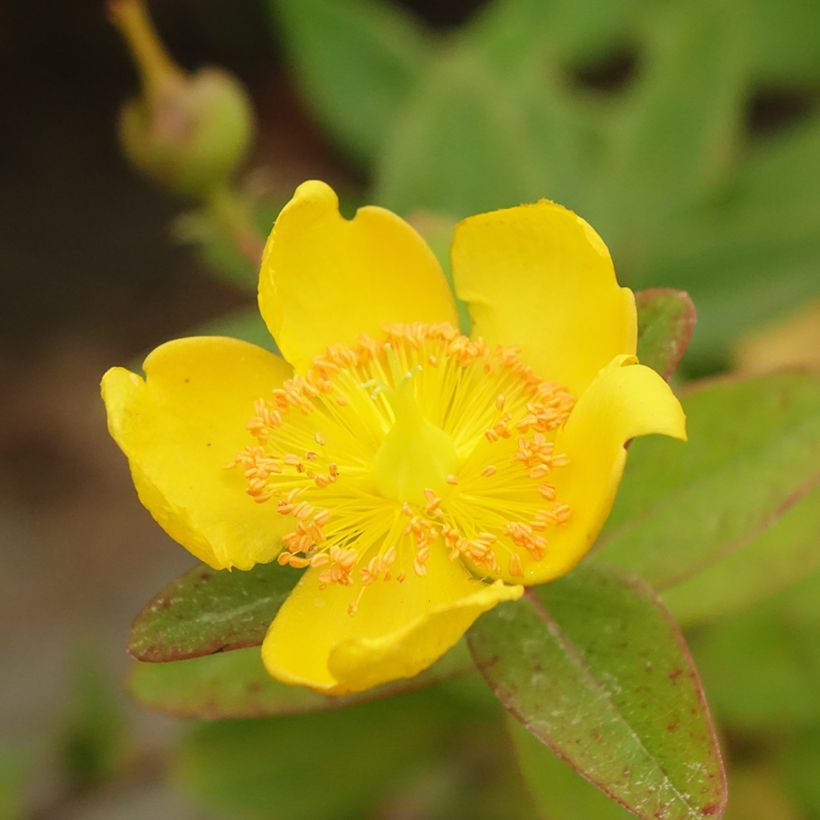

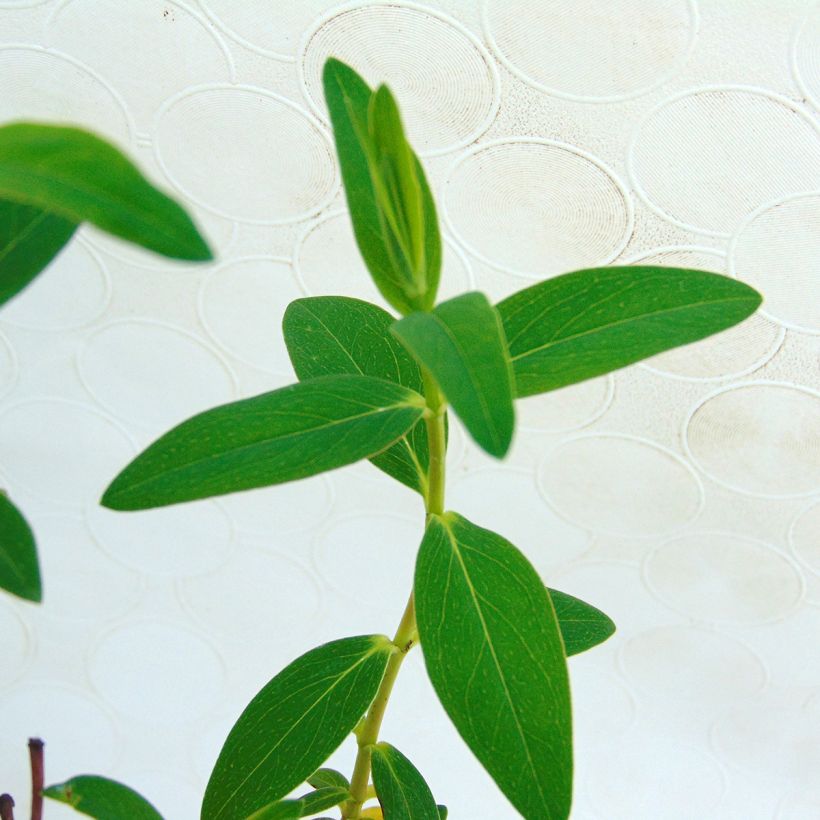

Plant habit
Flowering
Foliage
Botanical data
Hypericum
x dummeri
Peter Dummer
Clusiaceae
St. John's wort
Cultivar or hybrid
Other Hypericum - St.John's Wort
Planting and care
Plant in a sunny or semi-shaded location, or even in shade in a warm climate, sheltered from the wind. Its foliage can be damaged by too much scorching sun. It needs light, deep, well-drained soil as it fears humidity in winter. It can tolerate poor and chalky soil. It is hardy to -20°C (-4°F). It is not very susceptible to diseases and its enemies are rare. Cut back the bush to the ground at the end of winter to maintain a compact habit and encourage the appearance of flowering branches.
Planting period
Intended location
Care
-
, onOrder confirmed
Reply from on Promesse de fleurs
Late-flowering shrubs
Haven't found what you were looking for?
Hardiness is the lowest winter temperature a plant can endure without suffering serious damage or even dying. However, hardiness is affected by location (a sheltered area, such as a patio), protection (winter cover) and soil type (hardiness is improved by well-drained soil).

Photo Sharing Terms & Conditions
In order to encourage gardeners to interact and share their experiences, Promesse de fleurs offers various media enabling content to be uploaded onto its Site - in particular via the ‘Photo sharing’ module.
The User agrees to refrain from:
- Posting any content that is illegal, prejudicial, insulting, racist, inciteful to hatred, revisionist, contrary to public decency, that infringes on privacy or on the privacy rights of third parties, in particular the publicity rights of persons and goods, intellectual property rights, or the right to privacy.
- Submitting content on behalf of a third party;
- Impersonate the identity of a third party and/or publish any personal information about a third party;
In general, the User undertakes to refrain from any unethical behaviour.
All Content (in particular text, comments, files, images, photos, videos, creative works, etc.), which may be subject to property or intellectual property rights, image or other private rights, shall remain the property of the User, subject to the limited rights granted by the terms of the licence granted by Promesse de fleurs as stated below. Users are at liberty to publish or not to publish such Content on the Site, notably via the ‘Photo Sharing’ facility, and accept that this Content shall be made public and freely accessible, notably on the Internet.
Users further acknowledge, undertake to have ,and guarantee that they hold all necessary rights and permissions to publish such material on the Site, in particular with regard to the legislation in force pertaining to any privacy, property, intellectual property, image, or contractual rights, or rights of any other nature. By publishing such Content on the Site, Users acknowledge accepting full liability as publishers of the Content within the meaning of the law, and grant Promesse de fleurs, free of charge, an inclusive, worldwide licence for the said Content for the entire duration of its publication, including all reproduction, representation, up/downloading, displaying, performing, transmission, and storage rights.
Users also grant permission for their name to be linked to the Content and accept that this link may not always be made available.
By engaging in posting material, Users consent to their Content becoming automatically accessible on the Internet, in particular on other sites and/or blogs and/or web pages of the Promesse de fleurs site, including in particular social pages and the Promesse de fleurs catalogue.
Users may secure the removal of entrusted content free of charge by issuing a simple request via our contact form.
The flowering period indicated on our website applies to countries and regions located in USDA zone 8 (France, the United Kingdom, Ireland, the Netherlands, etc.)
It will vary according to where you live:
- In zones 9 to 10 (Italy, Spain, Greece, etc.), flowering will occur about 2 to 4 weeks earlier.
- In zones 6 to 7 (Germany, Poland, Slovenia, and lower mountainous regions), flowering will be delayed by 2 to 3 weeks.
- In zone 5 (Central Europe, Scandinavia), blooming will be delayed by 3 to 5 weeks.
In temperate climates, pruning of spring-flowering shrubs (forsythia, spireas, etc.) should be done just after flowering.
Pruning of summer-flowering shrubs (Indian Lilac, Perovskia, etc.) can be done in winter or spring.
In cold regions as well as with frost-sensitive plants, avoid pruning too early when severe frosts may still occur.
The planting period indicated on our website applies to countries and regions located in USDA zone 8 (France, United Kingdom, Ireland, Netherlands).
It will vary according to where you live:
- In Mediterranean zones (Marseille, Madrid, Milan, etc.), autumn and winter are the best planting periods.
- In continental zones (Strasbourg, Munich, Vienna, etc.), delay planting by 2 to 3 weeks in spring and bring it forward by 2 to 4 weeks in autumn.
- In mountainous regions (the Alps, Pyrenees, Carpathians, etc.), it is best to plant in late spring (May-June) or late summer (August-September).
The harvesting period indicated on our website applies to countries and regions in USDA zone 8 (France, England, Ireland, the Netherlands).
In colder areas (Scandinavia, Poland, Austria...) fruit and vegetable harvests are likely to be delayed by 3-4 weeks.
In warmer areas (Italy, Spain, Greece, etc.), harvesting will probably take place earlier, depending on weather conditions.
The sowing periods indicated on our website apply to countries and regions within USDA Zone 8 (France, UK, Ireland, Netherlands).
In colder areas (Scandinavia, Poland, Austria...), delay any outdoor sowing by 3-4 weeks, or sow under glass.
In warmer climes (Italy, Spain, Greece, etc.), bring outdoor sowing forward by a few weeks.

































